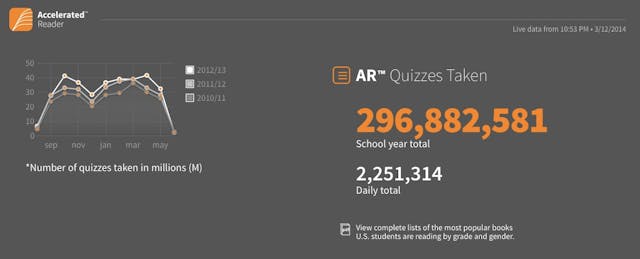Less than a month ago, Renaissance Learning, owned by Permira Fund, raised $40 million from Google Capital at a $1 billion valuation.
Today, Permira will be getting that amount--and a bit more. Hellman & Friedman, a private equity firm based in San Francisco, is shelling out $1.1 billion to acquire Renaissance Learning.
Renaissance CEO, Jack Lynch, tells EdSurge that Hellman & Friedman expressed their interest to Permira "over the holidays [in 2013]." He states that the Google Capital investment "pre-dated the Hellman & Friedman talks by several months" and there is no connection between the two. Google Capital was completely bought out by Hellman & Friedman but expects to reinvest in the company, according to a representative.
Hellman & Friedman's portfolio of previous companies include heavy hitters like The Nasdaq Stock Market, DoubleClick and Getty Images. It currently has one other education holding--Ellucian, which provides data management services to higher-ed institutions.
Renaissance Learning, based in Wisconsin Rapids, WI, was founded in 1984 by a wife-and-husband team, of Judi and Terry Paul, working out their basement. It's best known for Accelerated Reader, a reading software program that Judi developed to get their kids reading more. Since then, Accelerated Reader and Accelerated Math have become among the most widely used digital content programs in schools.
When London-based Permira acquired Renaissance in 2011 for $450 million, the company had a trailing 12-month revenue of $136 million, meaning that it sold for about 3.5 times the value of its revenue. At the time, Accelerated Reader comprised about 40% of sales (with services related to Accelerated Reader making up another 10%).
Since the company returned to the private market and brought on CEO Jack Lynch, who has a long history at companies including BigChalk and Pearson, Renaissance has grown. The company reports it hit "double-digit top line growth" in the two years since the acquisition, including 20% in 2013. That puts annual revenue roughly between $175 and $200 million. Google's $40 million investment--and Renaissance's coincidental $1 billion valuation--means investors calculated the company is worth more than 5.5 times revenue.
Lynch has been busy: In August 2013, Renaissance acquired Subtext, an iPad app (funded in part by Google Ventures and others) that lets students reading texts share notes and comments and also enables teachers to add in assignments and assessments. Industry watchers saw that acquisition as a key way to catapult Renaissance's role in the classroom. Indeed, the company now notes that "its learning progression--a sequencing of skills a student must master from kindergarten to high-school graduation--is powered by data from more than 45 million assessments taken each year by students at more than one third of U.S. schools."
The company's fastest-growing product, according to Lynch, is Renaissance's STAR assessment, a computer adaptive test that assesses student's proficiencies and weaknesses. Renaissance's UK business also spiked 50% last year, mostly from Accelerated Reader. Lynch says the company also has "fledgling" operations in South Korea and is expanding in former Commonwealth countries.
Private equity firms are classic investors that pay close heed to the financials. In the past, many of the mergers and acquisitions that have taken place in the education industry have been "strategic" deals among companies in the business. Even Google's investment has a whiff of "strategic": the Internet king is quietly wrestling with Apple for recognition as a dominant edtech company.
Private equity companies taking a bigger role signals that financially focused investors are paying more attention to the education sector. Other significant private equity firms in education include Providence Equity (which owns Ascend Learning, Blackboard among others); Apollo Global Management (which owns McGraw-Hill Education), ABS Capital, and Sterling Partners among others.
The industry is still waiting to see how many gems with both traction and revenue (such as Renaissance) will evolve from the maelstrom of startups and younger companies in the edtech space.
The Renaissance transaction is expected to close in the second quarter of 2014.


